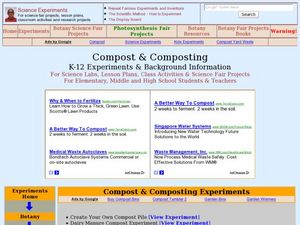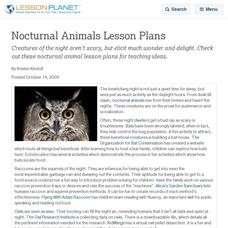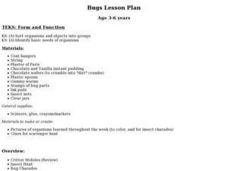Chicago Botanic Garden
Calculating Your Carbon Footprint
Unplugging from technology for one day per week will decrease your carbon footprint—are you up to the challenge? Part two in a series of three allows individuals to explore their personal carbon footprints. By first taking a quiz at home...
Curated OER
Lesson: Ginger Brooks Takahashi: Powerstich: A Forum for Community-Building
This is a great way to build community in your school, experience process-based art, and explore the critical-thinking process. While quilting as a class collectively (just like a quilting bee) pupils listen to poetry and prose of a...
Curated OER
Aquatic Roots
Young scientist use reference materials to research various local aquatic plants and or animals to find out whether they are natives or exotics. They investigate their impacts on people, other animals and the environment. High schoolers...
Marine Institute
Water Pollution
Sixth graders investigate the various types of pollutants found in water and ways to help prevent water pollution. Through a hands-on experiment, students create samples of polluted water by mixing water with vegetable oil, dirt,...
Chicago Botanic Garden
Historical Climate Cycles
Ice core samples give scientists access to climates of old—those from more than 800,000 years ago. Through an analysis of various temperature graphs from ice cores, tree rings, and weather stations, scholars compare historical climates...
Curated OER
The Principles Of Composting
Students put items in a plastic bag and watch the effects of composting. While completing the experiment, students answer questions and ask permission to start their own compost pile at home.
Curated OER
The Radish Experiment
First graders grow radishes. In this Science lesson, 1st graders observe the growth of radishes in both the light and dark. Students discuss what plants need to live.
Curated OER
Feathers for Lunch Lesson Plan
Students discover different types of birds and the habitats in which the dwell. In this bird lesson, students read Feathers for Lunch, discuss bird facts, and build a bird habitat.
Curated OER
Butterfly 1: Observing the Life Cycle of a Butterfly
Students observe and identify the characteristics of the life cycle of a butterfly.
Curated OER
Pornography Debate
Present your seniors with a controversial topic while studying the first amendment: pornography. This multi-layer resource has scholars writing a pros and cons research paper. They also attend a city council meeting to prepare for an...
Curated OER
Genetically Modified Foods in Perspective
Students research the concept of genetically modified foods. The purpose of the research is to increase science content knowledge and comprehension of the controversy surrounding the subject.
Curated OER
Insects Are Helpful!
Students see that insects do lots good and are very valuable to humans and nature. This is part of an ongoing effort to dispel fears of insects. They rotate through a series of centers that have examples of how insects contribute to our...
Curated OER
Mulch
Students conduct a series of experiments on mulching. In this earth science lesson, students discuss the benefits of mulching on soil. They explore how different types of mulch affect plant growth.
Curated OER
Compost and Composting Experiments
Students investigate the composting process through a variety of experiments. In this ecology lesson, students discuss the benefits of composting. They examine how compost affect plant growth.
Curated OER
COMPOSTING: WHY BOTHER?
Students explore the composting process and participate in a contest to make the most compost the fastest from the school's kitchen and yard waste.
Curated OER
Field Trip Preparation
Students prepare for a field trip. They navigate through a Underground Network site. This "field trip" can be conducted in a patch of healthy grass or soil anywhere you can find it: right outside your building, in a backyard or at a...
Curated OER
The Great Pollinators
Young scholars discover the reproductive parts of a plant. In this biology lesson, students identify and categorize several different plants they dissect in class. Young scholars record their information using a data chart.
Curated OER
Nature's Recycling Program
Students identify what materials make up compost. In this science of recycling lesson, students explain the benefits of composting determine how compost is a good plant fertilizer.
Curated OER
Nocturnal Animals Lesson Plans
Creatures of the night aren't scary, but elicit much wonder and delight. Check out these nocturnal animal lesson plans for teaching ideas.
Curated OER
Meet Molly An American Girl
Students examine concepts of personal finance. In this personal finance lesson, students use Valerie Tripp's, Meet Molly, An American Girl, to learn about saving and spending after World War II. They compare financial decisions after...
Curated OER
Nitrogen Fixation, OR What a Gas!
Students gain skill in the design, implementation, and reporting of a scientific research project using the scientific method. They set up an experiment to determine the effect of adding the Rhizobium bacteria to one group of legume...
Curated OER
Lettuce Us Be Different
Students evaluate their differences, then look at differences in plants. In this class team building and life science lesson plan, the class play a game that focuses on similarities and differences in the group, then students plant three...
Curated OER
Causal Patterns in Ecosystems Section 3
Students design and create a worm and worm free compost tanks for observation of decay in ecosystems. They make predictions, care, and revist tanks using their journals for observation and data collection.
Curated OER
Bugs Lesson Plan
Students complete a unit of lessons on insects. They participate in a bug hunt, construct paper flowers, discuss pollination, create bug paperweights and insect mobiles, play bug charades, and participate in a bug scavenger hunt.























